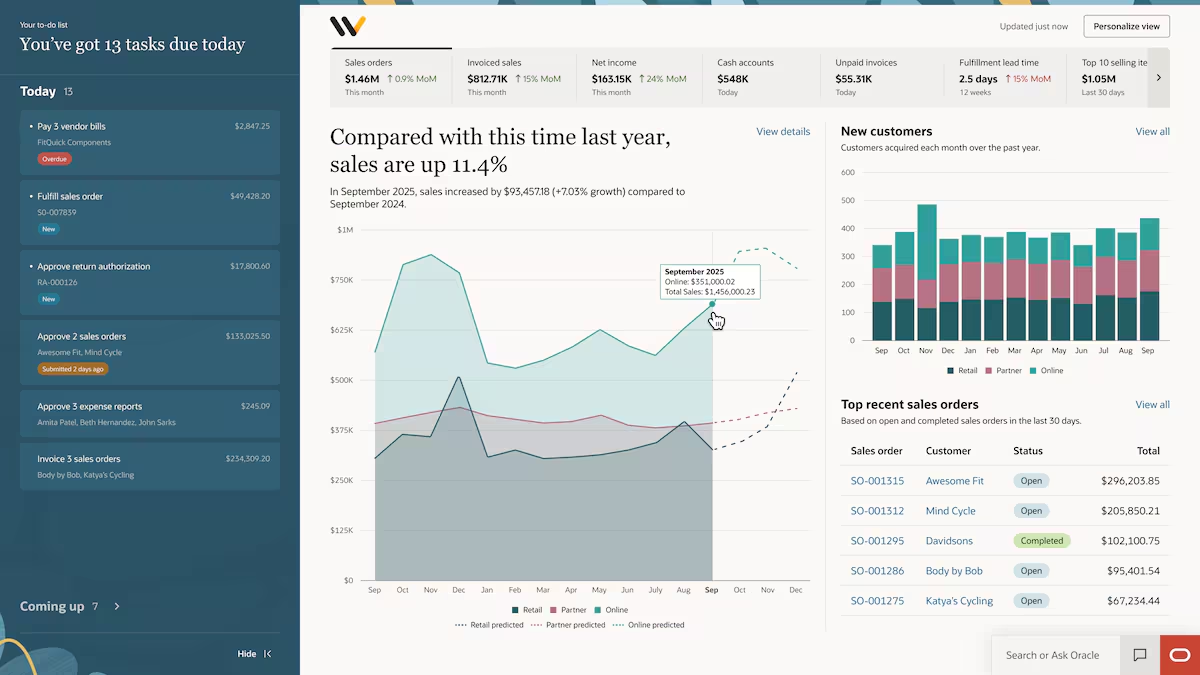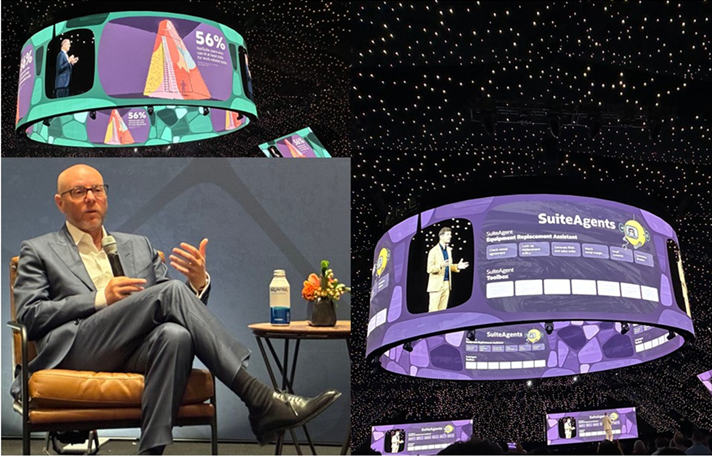With much fanfare, NetSuite unwrapped the next version of its ERP system infused with AI agents, inferencing and reasoning capabilities, as well as a bold vision to automate different aspects of small and midsized companies and their operations from accounting to inventory management and sales.
The October launch of NetSuite Next at SuiteWorld in Las Vegas – attended by more than 8,000 customers and partners in a slick production packed with rich story-telling narratives – was considered a perfect forum to gauge the early reception of AI, in addition to deciphering clear signals from users on their buying behavior for agent-led automation amid shifting market dynamics and growing interest in next-generation cloud infrastructure.
Evan Goldberg, executive vice president and founder of Oracle NetSuite, has said that with its general availability next year, NetSuite Next is going to be the most significant release from the software vendor since its inception in 1998.
At the heart of NetSuite Next is Ask Oracle, a conversational assistant that provides search results, insights and recommendations in real time by drawing on each customer’s own NetSuite data.
Because of its integrated suite approach, Goldberg said NetSuite Next can deliver more reliable and trustworthy results through the use of built-in transparency pattern that explains data sources and logic behind any AI-generated recommendation on everything from eCommerce product configuration to optimized inventory levels. NetSuite users can switch to NetSuite Next with the simple press of a button.
Other readily available features include standardized cloud data models that support autonomous financial close, embedded analytics and fine-tuned reporting, and industry extensibility for asset-intensive and subscription-based companies.
Donning a tuxedo on stage, Gary Wiessinger, senior vice president of application development of Oracle NetSuite, stood under images of other tuxedo-clad executives generated by AI, announcing an array of AI services that extend NetSuite Next’s reach to external data sources and enable NetSuite customers to build their own agents and AI workflows with new AI innovations in SuiteCloud Platform.
Wiessinger said an internal survey showed 56% of NetSuite users are already using AI for work-related tasks at least daily.

Brian Chess, senior vice president of technology and AI of Oracle NetSuite, said AI innovations in NetSuite Next and ones currently available such as support for Model Context Protocol (MCP) within AI Connector Service will enable faster synchronization with external assistants, more-responsive multi-agent workflows, and easier integration with third-party AI platforms. As part of this strategy, NetSuite also announced a partnership with Bill to streamline accounts payable processes and bring intelligent payment automation directly into the suite.
Some early adopters of NetSuite AI features reported already seeing measurable results. For example, Claudia Freed, president and chief executive officer of EALgreen, said the nonprofit has recently rolled out NetSuite Intelligent Item Recommendations and Text Enhance within a three-month period. She added that EALgreen deployed the NetSuite AI Connector Service in three weeks to connect its NetSuite data to external language models, such as Claude and ChatGPT, to automatically identify donated items, assess their potential impact, and update inventory in real-time. “It’s very easy to adopt NetSuite AI tools,’’ Freed said, adding that the AI tools have been instrumental in improving its inventory turns and helped convert tens of millions of dollars of donated goods into more scholarship funding.
Despite the optimism, customers are confronted with a double-edged sword. On one hand, it is imperative that NetSuite is leveraging AI in full throttle given Oracle’s staggering investment in scaling out its cloud infrastructure for such elaborate AI training and inferencing projects currently under way at NetSuite and clients like OpenAI, and xAI.
On the other hand, the risks of AI may come in the forms of trust and the inability to predict long-term support requirements – similar to the move from analog to digital for website operators to fully understand the amount of work involved in keeping their online presence robust and productive as opposed to just treating it as brochureware following the initial hype.
Ranga Bodla, NetSuite vice president of field engagement and marketing, said NetSuite gives customers full control over data that may be shared with third-party LLMs through its AI Connector Service and this granular control helps ensure sensitive information is not shared with these training models.
Already hard pressed by a tight IT budget and less resources to begin with compared with larger organizations, many NetSuite customers may find the use of AI appeals more to their need of saving time than eliminating labor. Still, as with any new technology, realizing the full value of AI could entail more human oversight and refinement for the time being. Even leading model innovators like Meta and OpenAI rely on third-party organizations like Scale AI and Mercor for training of their digital agents, underscoring that human involvement remains essential in building intelligent systems.
Unlike bigger entities that can be slowed by complex compliance requirements or legacy processes can slow, Goldberg estimates that a significant portion of its installed base of 43,000 customers – primarily small and midsized organizations with dozens or several hundred employees – could become prolific users of its AI features in a compressed time frame because of their penchant for innovation, speed and agility.
He added that NetSuite will be monitoring the early adoption carefully to help customers deploy AI safely and effectively as they extend models to their own NetSuite data. “We are going to do a lot of heavy lifting for them,’’ Goldberg said, adding that “Over time, our customers will tailor how they use AI based on their own data and goals.’’
The good news is that its customers are finding their experiences more useful and indispensable every day.
An IT director at a social welfare organization in Maryland said its recent migration from Microsoft Dynamics NAV to NetSuite has been rapid, smooth and practically glitch-free.
With over 2,500 users on multiple NetSuite applications, Rick Bauerly, founder and chief executive officer of investment firm Granite Partners in Minneapolis, said none of its portfolio companies have had any security or unplanned system downtime issues for the past 25 years using its software.
Coupling the speed of deployment with system stability yields a level of satisfaction that has turned NetSuite into one of the few ERP vendors to engender a fair amount of goodwill among its customers.
For years, the vibes surrounding the three-day SuiteWorld have been cleverly designed, contagious and communal, a far cry from other trade shows that are either strait-laced or stage-managed painstakingly by a single vendor to decorate everything that line the conference halls and the thoroughfare.
Inside a giant tent at the Caesars Forum against the backdrop of a 550-foot-tall Ferris wheel of Las Vegas, no matter where they sit thousands of SuiteWorld attendees could experience face-to-face interactions with keynote speakers strategically positioning themselves on a rotating turntable doubling as the main stage. The setup entailed relevancy as much as intimacy.
Outside the dining hall Oktoberfest style, attendees could help themselves by fetching cans of premium non-alcoholic beer by BERO, a fast-growing brewery that runs NetSuite ERP, or they would sample an assortment of consumer products from skincare lotions to healthy snacks made by companies all standardizing on NetSuite applications and all turning the event into a promotional vehicle as much as a virtuous feedback loop. Meanwhile, mobs of NetSuite administrators would line up for free plush toys from vending machines. The musical act this year was Pitbull, a rapper with a melting-pot background.
In many ways, SuiteWorld blended elements of a cultural festival with a forward-looking AI summit, capturing the entrepreneurial spirit at the heart of the NetSuite community. The feel of vibe coding was real, but perhaps vibe conferencing was more evident.
For that reason, the success of an application product these days may not simply rest with how it adapts to AI or whether apps should be elevated holistically in order to relegate agents to bots and nothing else, but rather how vendors like NetSuite continuously redefine the connection between technology and the customers who rely on it.




